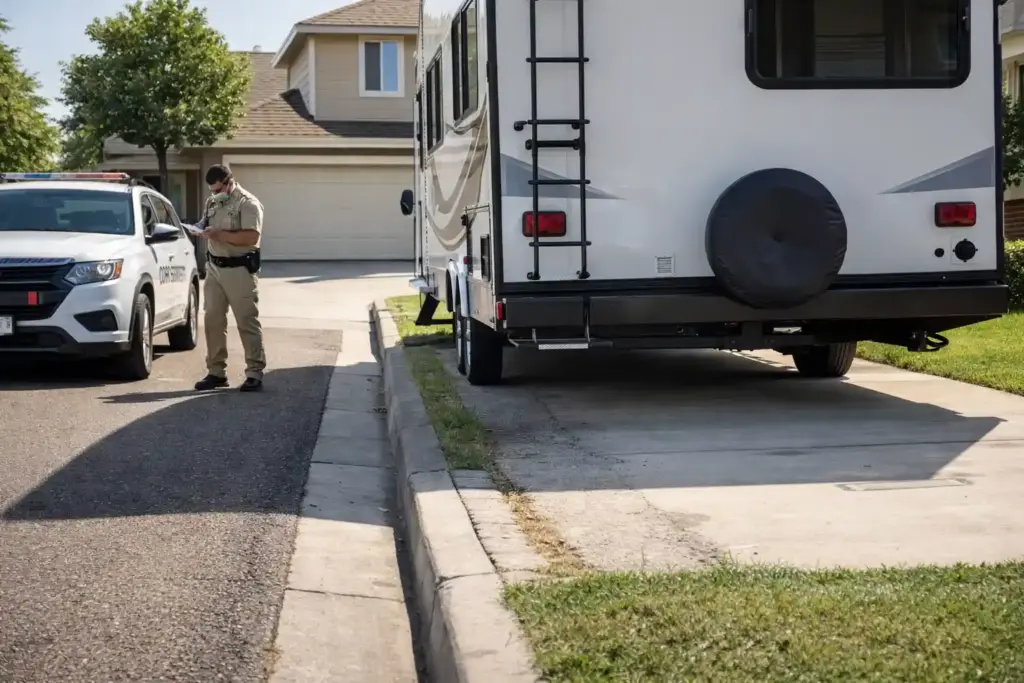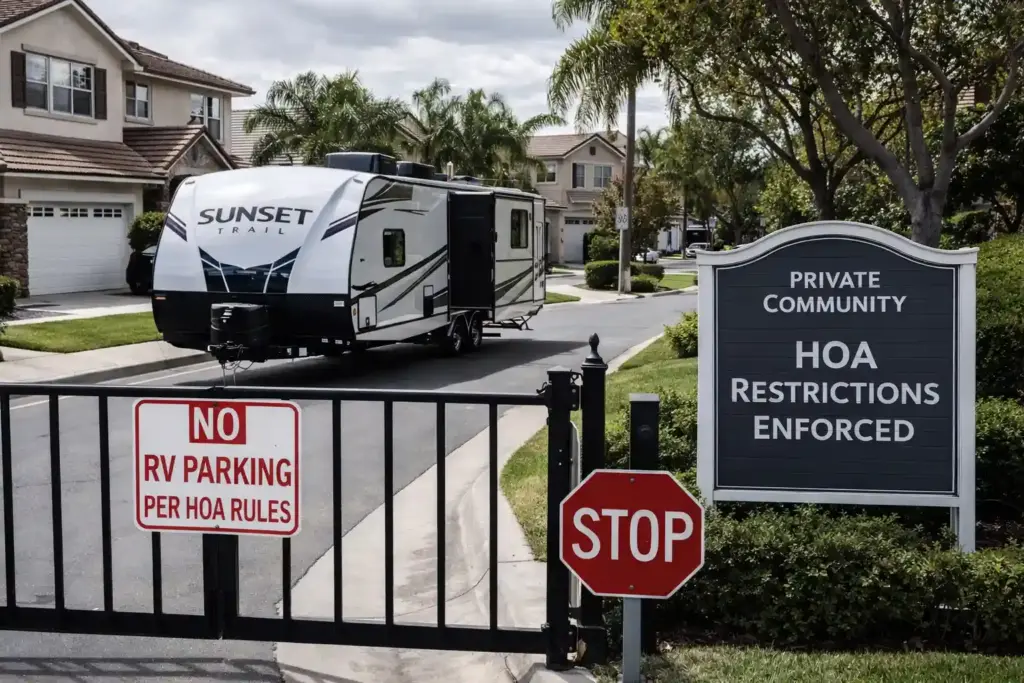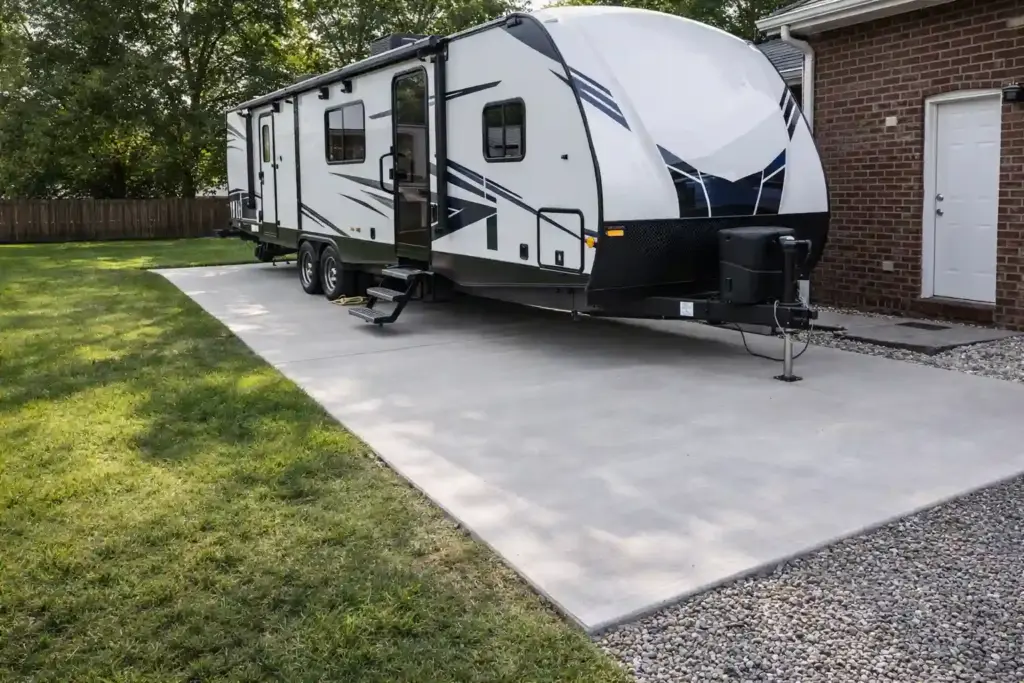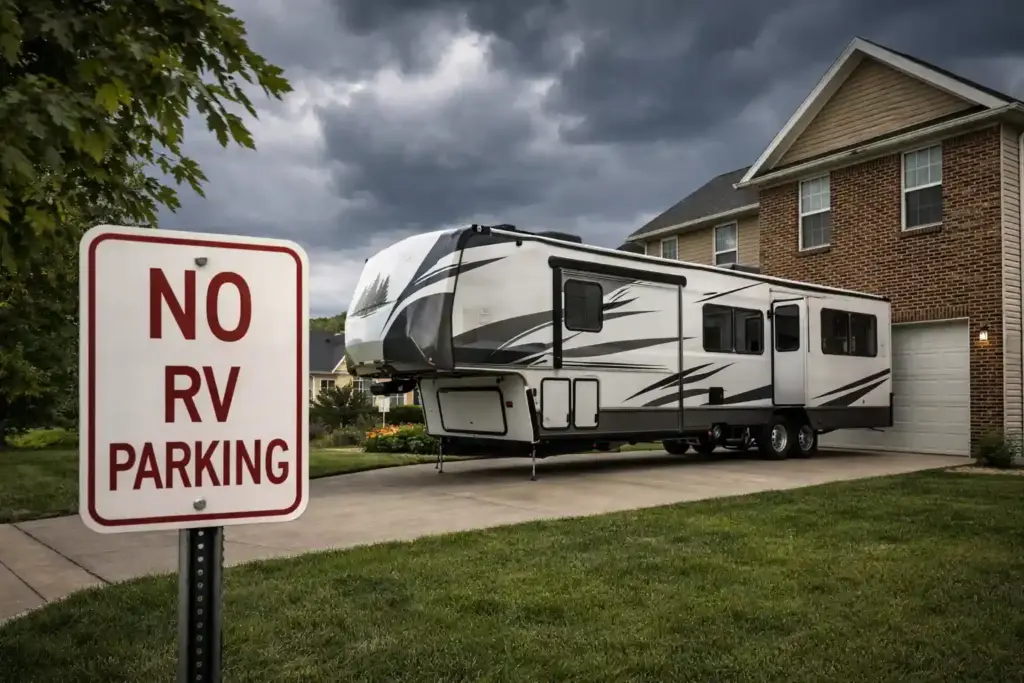I still remember bringing home my first thirty foot travel trailer. My excitement quickly turned into stress when a neighbor mentioned strict city rules about large vehicles on residential lots. I spent hours digging through municipal codes and HOA documents to find out if my new rig was breaking the law. If you are looking out your window at your rig, you are probably asking, Can I Park an RV in My Driveway Is It Legal?, especially if you want to avoid a heavy fine.
💡Key Takeaways
- Local Hierarchy: Legality is determined by a combination of HOA rules, city ordinances, and county zoning laws.
- Size and Setbacks: Many cities restrict length or require a specific distance from the sidewalk to maintain road visibility.
- Habitation Bans: In almost every jurisdiction, it is illegal to live in an RV while it is parked in a residential driveway.
- Improved Surfaces: Most ordinances require parking on concrete or asphalt to prevent environmental damage.
My Experience with RV Parking at Home
I quickly learned that RV parking at home is a privilege with many strings attached. Most cities view RVs as structures that can impact neighborhood aesthetics and safety. You must consider how your vehicle affects the line of sight for drivers turning corners or pulling out of nearby garages. A large motorhome can easily block the view of a neighbor reversing out of their own driveway.
Is It Legal to Park an RV on Residential Property?

Suburban and urban zones are increasingly restrictive about what can stay in a driveway. I had to measure my driveway total length and compare it to city setback requirements to remain in compliance. I specifically asked the planning board is it legal to park an RV on residential property in our specific zip code. Even if the wheels are on your property, a protruding bumper can trigger a visit from a code enforcement officer.
How to Determine If You Can I Park My RV in My Driveway
Check your neighborhood regulations before city laws.If you live in a Homeowners Association, you are bound by Covenants Conditions and Restrictions (CCRs). When I asked can i park my RV in my driveway at my last house, the HOA pointed to a clause limiting parking to forty eight hours. These private rules are often stricter than city laws and lead to daily fines.
Where Can You Legally Park an RV?
In non HOA neighborhoods, your concern shifts to the local zoning department. I asked City Hall where can you legally park an RV in our residential zone.They explained that while short term parking is allowed for trip prep, long term storage often requires the vehicle to be behind the front building line based on local zoning ordinances. Many cities offer digital maps to look up zoning codes by street address.
Can You Have an RV on Your Property?
I clarified with my local council if the type of vehicle mattered for the permit, especially when researching Can I Park an RV in My Driveway Is It Legal? before making any storage decisions. I asked can you have an RV on your property if it is a pop up camper versus a large motorhome. They explained that any vehicle designed for temporary living quarters falls under the same storage rules. This means small trailers must follow the same setback guidelines as massive buses.
Understanding Common HOA RV Parking Rules

HOAs often operate under eyesore rules, believing large vehicles detract from collective property values. I have lived where the hoa RV parking rules were so tight I could not park for a single night. They often require the RV to be stored off site or in a specialized garage matching the home’s exterior. However, many HOAs offer a loading grace period of twenty four to seventy two hours for active travelers.
RV Storage on Private Property Laws
I once knew a camper who hid his trailer under a tarp, which actually violated unsightly cover rules, and it reminded me how important proper RV sewer hose storage and overall rig organization can be when you’re trying to keep everything looking tidy on private property. I researched RV storage on private property rules to see if I could build a structure to hide the rig. It is always better to seek a variance than to hide a violation. If you build a carport without a permit, you may be forced to tear it down later.
Dealing with City Ordinances and the RV Driveway

Your RV driveway must meet city standards, which often require a hard, improved surface, because local governments rely on Planning and Land Use policies to regulate how residential properties are used and maintained. Many municipalities forbid parking on grass to prevent oil leaks and maintain property standards. I eventually poured a dedicated concrete pad to stay within the legal framework. Additionally, heavy motorhomes can crack standard residential driveways not designed for high weight loads.
Is It Legal to Live in a Camper in Your Backyard?
People often wonder is it legal to live in a camper in your backyard for guests or as an office. From my research, the answer is almost universally no for long term stays, especially for those considering full-time living in an RV on residential property. Most health codes require permanent connections to sewer and electricity that driveway parking cannot provide. Cities also worry about fire safety when people sleep in vehicles parked close to a primary residence.
Can One Live in a Travel Trailer in Your Driveway?
I asked a code officer can one live in a travel trailer in your driveway if they use the house for bathrooms. The city cited safety concerns regarding secondary exits during a fire. While some cities allow guest stays for seven to fourteen days, these often require a temporary permit. You should always check if your city requires a special tag for temporary habitation.
Asking Can Someone Live in an RV on My Property?
When asked can someone live in an RV on my property, I had to explain that zoning laws prevent informal trailer parks. If code enforcement finds evidence of someone living in the rig, such as extension cords or plumbing use, they issue a cease and desist. It is better to look for a local RV park with proper hookups to avoid legal entanglements. Neighbors are very likely to report long term guests living in a driveway.
Investigating Do I Need a Permit to Park an RV on My Property?
In high density areas, you may ask do i need a permit to park an RV on my property even for loading, particularly if you are also wondering Can I Park an RV in My Driveway Is It Legal? under your specific zoning rules. Some cities require a permanent permit for long term storage if the vehicle is visible from the street. This involves an inspection to ensure the RV does not block emergency access points. Having a permit is a great defense against neighbor complaints.
Navigating Local RV Parking Regulations
Every county has unique RV parking regulations. Northern states have strict rules regarding snow removal, while warmer climates focus on preventing overgrown vegetation from hiding vehicles. Staying ahead of legislative changes by attending city council meetings can save you from surprise citations. I keep a printed copy of the local code in my glove box just in case.
🎥 See How RV Parking Rules Are Enforced
This short video explains how cities enforce RV parking laws, what commonly triggers complaints, and when a parked RV becomes a violation. It adds real-world context to the local RV parking rules discussed above.
Managing RV Street Parking and Road Visibility
Regarding RV parking on street in front of house locations, most cities prohibit large rigs on public roads. They block the view for other drivers and narrow the passage for emergency vehicles. I always ask can you park an RV on a residential street without safety cones. Usually, the answer is only for a few hours while you actively load your gear.
How Long Can an RV Be Parked on the Street?
The standard limit for how long can an RV be parked on the street is usually three days. After this, it may be tagged as a nuisance or hazard by local police. Similarly, if you wonder how long can i park my RV in front of my house, the limit is often one week for guests. This usually requires the vehicle to be moved at least every seventy two hours to show it is mobile.
RV Parking on Private Property Ethics
I discovered that RV parking on private property is viewed through land use lenses. Even if a friend offers space, their subdivision may forbid storing third party recreational vehicles. Always update your insurance primary storage location to ensure coverage remains valid. Storing a vehicle at an unlisted address could lead to a denied claim if a storm occurs.

Navigating Specific State Constraints
People ask can you park an RV in your driveway in california; cities here are strict about sidewalk proximity and vehicle length. Some coastal towns have banned oversized vehicles entirely on narrow residential streets. The question can you park an RV in your driveway in florida is usually dictated by the HOA rather than state law. Many beach communities enforce strict rules to prevent vacationers from camping in driveways.
RV Parking on Residential Property in Texas
Regarding RV parking on residential property in texas, urban areas typically require a paved concrete surface and specific street setbacks. Rural counties in the state are often much more relaxed about where you keep your rig. I found that Houston and Dallas have very specific ordinances regarding the height of the vehicle. Always check with the local county clerk before setting up a permanent pad.
Avoiding Common RV Parking Penalties
If your driveway is not a legal option, local storage facilities offer affordable rates and better security. It is better to pay a small fee than face thousands in fines from the city. At the end of the day, can i park an RV in my driveway is it legal is about balancing freedom with community rules. I eventually decided that a professional storage lot was worth the peace of mind.
Protecting Your Property Investment
Storing your rig at home requires ongoing maintenance to avoid code violations. I make sure to keep the area around my tires free of weeds and debris. Many cities have nuisance laws that target vehicles with flat tires or broken windows. Keeping your RV clean shows the city that it is a maintained vehicle rather than a piece of junk.
FAQs:
1. Can I park an RV in my driveway is it legal in a residential area?
Yes, it is legal for a limited time as long as you follow local zoning setbacks, city ordinances, and HOA guidelines.
2. Can I park my RV in my driveway if it is over 25 feet?
No, many cities restrict the length of vehicles parked in residential driveways to under 22 or 25 feet.
3. How long can an RV be parked in a driveway for cleaning?
Most municipalities allow a 72 hour window for trip preparation, cleaning, and basic maintenance.
4. How long can an RV be parked on the street for loading?
Most cities grant a 24 to 48 hour grace period for active loading and unloading tasks.
5. What is the primary purpose of local RV parking rules?
These laws exist to maintain neighborhood aesthetics and ensure clear visibility for road safety.
Final Thoughts on Residential RV Parking Rules
I hope my personal journey through the world of RV regulations has helped you feel more confident about your own situation. Dealing with the legal side of camping is not nearly as fun as picking out a new campsite, but it is a necessary part of the hobby. I have learned that being proactive and respectful of my neighbors has kept me out of trouble for many years. Once you have a legal and safe place to park, you can finally relax and focus on your next big adventure.
If you ever feel overwhelmed by the rules, just remember that they are there to keep everyone safe and the neighborhood looking its best. I have found that a little bit of research goes a long way in preventing the knock on the door from a code enforcement officer. Take the time to measure your space, read the fine print, and perhaps even chat with your neighbors about your plans. A little bit of kindness and a well placed rig can make all the difference in your local community.
The answer to can i park an RV in my driveway is it legal will always come down to your specific address and local codes. I have found that the more I know about my local laws, the more I can enjoy the freedom of owning my trailer. It is all about doing the legwork early so that you can enjoy the road later on. I look forward to seeing you out there at the campgrounds with your own perfectly parked rig.

